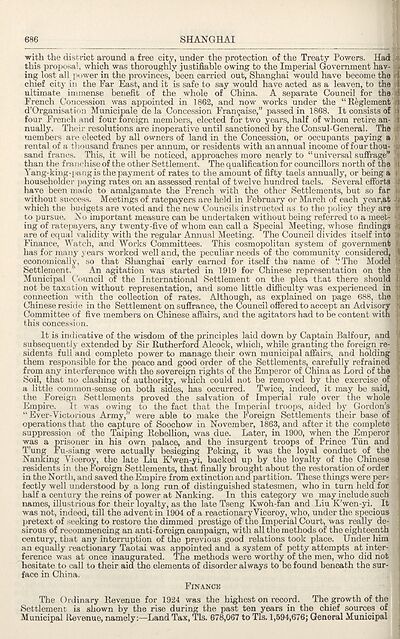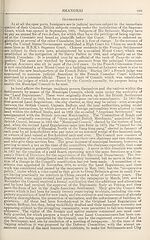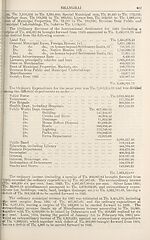1926
(742) Page 686
Download files
Complete book:
Individual page:
Thumbnail gallery: Grid view | List view

SHANGHAI
with the district around a free city, under the protection of the Treaty Powers. Had ||
this proposal, which was thoroughly justifiable owing to the Imperial Government hav- it:
ing lost all power in the provinces, been carried out, Shanghai would have become the i c
chief city in the Far East, and it is safe to say would have acted as a leaven, to the 111
ultimate immense benefit of the whole of China. A separate Council for the £
French Concession was appointed in 1862, and now works under the “ Reglement 1
d’Organisation Municipale de la Concession Frangaise,” passed in 1868. It consists of t
four French and four foreign members, elected for two years, half of whom retire an- 1
nually. Their resolutions are inoperative until sanctioned by the Consul-General. The i
members are elected by all owners of land in the Concession, or occupants paying a i
rental of a thousand francs per annum, or residents with an annual income of four thou- I
sand francs. This, it will be noticed, approaches more nearly to “universal suffrage”
than the franchise of the other Settlement. The qualification for councillors north of the 1
Yang-king-pang is the payment of rates to the amount of fifty taels annually, or being a
householder paying rates on an assessed rental of twelve hundred taels. Several efforts 1
have been made to amalgamate the French with the other Settlements, but so far i
without success. Meetings of ratepayers are held in February or March of each year,at f
which the budgets are voted and the new Councils instructed as to the policy they are I
to pursue. No important measure can be undertaken without being referred to a meet- |
ing of ratepayers, any twenty-five of whom can call a Special Meeting, whose findings jl
are of equal validity with the regular Annual Meeting. The Council divides itself into |
Finance, Watch, and Works Committees. This cosmopolitan system of government
has for many years worked well and, the peculiar needs of the community considered, tj
economically, so that Shanghai early earned for itself the name of “ The Model 1
Settlement.” An agitation was started in 1919 for Chinese representation on the
Municipal Council of the International Settlement on the plea that there should ;
not be taxation without representation, and some little difficulty was experienced in
connection with the collection of rates. Although, as explained on page 688, the '
Chinese reside in the Settlement on suffranee, the Council offered to accept an Advisory i
Committee of five members on Chinese affairs, and the agitators had to be content with j
this concession.
It is indicative of the wisdom of the principles laid down by Captain Balfour, and 1
subsequently extended by Sir Rutherford Alcock, which, while granting the foreign re- |
sidents full and complete power to manage their own municipal affairs, and holding,
them responsible for the peace and good order of the Settlements, carefully refrained
from any interference with the sovereign rights of the Emperor of China as Lord of the ■
Soil, that no clashing of authority, which could not be removed by the exercise of
a little common-sense on both sides, has occurred. Twice, indeed, it may be said, J
the Foreign Settlements proved the salvation of Imperial rule over the whole i
Empire. It was owing to the fact that the Imperial troops, aided by Gordon’s |
“Ever-Victorious Army,” were able to make the Foreign Settlements their base of
operations that the capture of Soochow in November, 1863, and after it the complete ”
suppression of the Taiping Rebellion, was due. Later, in 1900, when the Emperor
was a prisoner in his own palace, and the insurgent troops of Prince Tim and
T’ung Fu-siang were actually besieging Peking, it was the loyal conduct of the
Nanking Viceroy, the late Liu K’wen-yi, backed up by the loyalty of the Chinese j
residents in the Foreign Settlements, that finally brought about the restoration of order |
in the North, and saved the Empire from extinction and partition. These things were per-
fectly well understood by a long run of distinguished statesmen, who in turn held for
half a century the reins of power at Nanking. In this category we may include such
names, illustrious for their loyalty, as the late Tseng Kwoh-fan and Liu K’wen-yi. It
was not, indeed, till the advent in 1904 of a reactionary Viceroy, who, under the specious
pretext of seeking to restore the dimmed prestige of the Imperial Court, was really de¬
sirous of recommencing an anti-foreign campaign, with all the methods of the eighteenth
century, that any interruption of the previous good relations took place. Under him
an equally reactionary Taotai was appointed and a system of petty attempts at inter¬
ference was at once inaugurated. The methods were worthy of the men, who did not
hesitate to call to their aia the elements of disorder always to be found beneath the sur¬
face in China.
Finance
The Ordinary Revenue for 1924 was the highest on record. The growth of the
Settlement is shown by the rise during the past ten years in the chief sources of
Municipal Revenue, namely:—Land Tax, TLs. 678,067 to Tls. 1,594,676; General Municipal
with the district around a free city, under the protection of the Treaty Powers. Had ||
this proposal, which was thoroughly justifiable owing to the Imperial Government hav- it:
ing lost all power in the provinces, been carried out, Shanghai would have become the i c
chief city in the Far East, and it is safe to say would have acted as a leaven, to the 111
ultimate immense benefit of the whole of China. A separate Council for the £
French Concession was appointed in 1862, and now works under the “ Reglement 1
d’Organisation Municipale de la Concession Frangaise,” passed in 1868. It consists of t
four French and four foreign members, elected for two years, half of whom retire an- 1
nually. Their resolutions are inoperative until sanctioned by the Consul-General. The i
members are elected by all owners of land in the Concession, or occupants paying a i
rental of a thousand francs per annum, or residents with an annual income of four thou- I
sand francs. This, it will be noticed, approaches more nearly to “universal suffrage”
than the franchise of the other Settlement. The qualification for councillors north of the 1
Yang-king-pang is the payment of rates to the amount of fifty taels annually, or being a
householder paying rates on an assessed rental of twelve hundred taels. Several efforts 1
have been made to amalgamate the French with the other Settlements, but so far i
without success. Meetings of ratepayers are held in February or March of each year,at f
which the budgets are voted and the new Councils instructed as to the policy they are I
to pursue. No important measure can be undertaken without being referred to a meet- |
ing of ratepayers, any twenty-five of whom can call a Special Meeting, whose findings jl
are of equal validity with the regular Annual Meeting. The Council divides itself into |
Finance, Watch, and Works Committees. This cosmopolitan system of government
has for many years worked well and, the peculiar needs of the community considered, tj
economically, so that Shanghai early earned for itself the name of “ The Model 1
Settlement.” An agitation was started in 1919 for Chinese representation on the
Municipal Council of the International Settlement on the plea that there should ;
not be taxation without representation, and some little difficulty was experienced in
connection with the collection of rates. Although, as explained on page 688, the '
Chinese reside in the Settlement on suffranee, the Council offered to accept an Advisory i
Committee of five members on Chinese affairs, and the agitators had to be content with j
this concession.
It is indicative of the wisdom of the principles laid down by Captain Balfour, and 1
subsequently extended by Sir Rutherford Alcock, which, while granting the foreign re- |
sidents full and complete power to manage their own municipal affairs, and holding,
them responsible for the peace and good order of the Settlements, carefully refrained
from any interference with the sovereign rights of the Emperor of China as Lord of the ■
Soil, that no clashing of authority, which could not be removed by the exercise of
a little common-sense on both sides, has occurred. Twice, indeed, it may be said, J
the Foreign Settlements proved the salvation of Imperial rule over the whole i
Empire. It was owing to the fact that the Imperial troops, aided by Gordon’s |
“Ever-Victorious Army,” were able to make the Foreign Settlements their base of
operations that the capture of Soochow in November, 1863, and after it the complete ”
suppression of the Taiping Rebellion, was due. Later, in 1900, when the Emperor
was a prisoner in his own palace, and the insurgent troops of Prince Tim and
T’ung Fu-siang were actually besieging Peking, it was the loyal conduct of the
Nanking Viceroy, the late Liu K’wen-yi, backed up by the loyalty of the Chinese j
residents in the Foreign Settlements, that finally brought about the restoration of order |
in the North, and saved the Empire from extinction and partition. These things were per-
fectly well understood by a long run of distinguished statesmen, who in turn held for
half a century the reins of power at Nanking. In this category we may include such
names, illustrious for their loyalty, as the late Tseng Kwoh-fan and Liu K’wen-yi. It
was not, indeed, till the advent in 1904 of a reactionary Viceroy, who, under the specious
pretext of seeking to restore the dimmed prestige of the Imperial Court, was really de¬
sirous of recommencing an anti-foreign campaign, with all the methods of the eighteenth
century, that any interruption of the previous good relations took place. Under him
an equally reactionary Taotai was appointed and a system of petty attempts at inter¬
ference was at once inaugurated. The methods were worthy of the men, who did not
hesitate to call to their aia the elements of disorder always to be found beneath the sur¬
face in China.
Finance
The Ordinary Revenue for 1924 was the highest on record. The growth of the
Settlement is shown by the rise during the past ten years in the chief sources of
Municipal Revenue, namely:—Land Tax, TLs. 678,067 to Tls. 1,594,676; General Municipal
Set display mode to:
![]() Universal Viewer |
Universal Viewer | ![]() Mirador |
Large image | Transcription
Mirador |
Large image | Transcription
Images and transcriptions on this page, including medium image downloads, may be used under the Creative Commons Attribution 4.0 International Licence unless otherwise stated. ![]()
| Asian directories and chronicles > 1926 > (742) Page 686 |
|---|
| Permanent URL | https://digital.nls.uk/196497819 |
|---|
| Attribution and copyright: |
|
|---|---|
| Description | Volumes from the Asian 'Directory and Chronicle' series covering 1917-1941, but missing 1919 and 1923. Compiled annually from a multiplicity of local sources and research. They provide listings of each country's active corporations, foreign residents and government agencies of all nationalities for that year, together with their addresses. Content includes: various treaties; coverage of conflicts; currencies and taxes; consular fees; weights and measures; public holidays; festivals and traditions. A source of information for both Western states and communities of foreigners living in Asia. Published by Hongkong Daily Press. |
|---|---|
| Shelfmark | H3.86.1303 |
| Additional NLS resources: |

